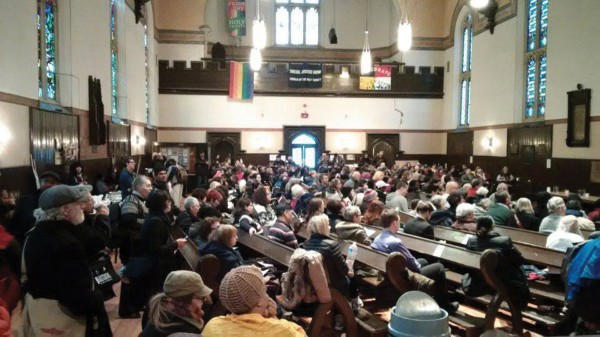Court rejects charter challenge days after hundreds rally and discuss homelessness in Toronto on National Housing Day
“Housing is a human right!”
That was the message of the rally and subsequent forum held on National Housing Day. Hundreds of people rallied at Yonge-Dundas Square then crowded into the Church of the Holy Trinity to hear activists discuss what the United Nations has called Canada’s national homelessness “emergency.”
“The Federal government’s refusal to renew housing subsidies means that hundreds of thousands of people will be put at risk of losing their homes,” said Helen Luu, a member of the Right to Housing (R2H) Coalition in a press release. “We are speaking up today because housing is a human right, yet we have a worsening homelessness crisis in one of the world’s richest countries. We are demanding a national housing strategy and adequate investment in housing to prevent and eventually end homelessness.”
The R2H Coalition sponsored the forum which took place after the rally. People from a variety of backgrounds and expertise including people with lived experience of homelessness or of being inadequately housed, community organizers, advocates and academics spoke out at the forum.
In Ontario, successes are happening in communities and in the courts.
Phillip Dufresne said the Toronto-based supportive housing advocacy group he works with, called the Dream Team, has overturned bylaws discriminating against supportive housing in five Ontario municipalities.
Tracy Heffernan spoke on behalf of the Advocacy Centre for Tenants Ontario (ACTO) about another courts-based attempt to “solve” Canada’s housing emergency and her work as the co-counsel on the Right to Housing charter challenge.
This case is based on the premise that “Canada’s failure to respond to the homelessness crisis violates the Charter of Rights and Freedoms and specifically, s.7 which guarantees the right to life, liberty, and security of the person and s.15 which guarantees the equal protection and benefit of the law without discrimination,” according to the ACTO website.
ACTO, like the other co-counsels in this case, takes the stance that, “under the charter, people in Canada have a right to adequate, affordable housing (these co-counsels are asking) the court to declare that homelessness and inadequate housing violate the charter, and that the government must develop a national and provincial strategy to end homelessness.”
DJ Larkin related how, in Vancouver, the Pivot Legal Society is pursuing a court case concerning access to safe shelter as a basic human right.
The Charter Challenge for the Right to Housing continued to the next level on Monday when in a split decision the Superior Court of Ontario upheld the ruling of a lower court of appeal.
“Issues of broad economic policy and priorities are unsuited to judicial review,” Justice Gladys Pardu with the backing of Justice George Strathy said in the decision. “Here the court is not asked to engage in a ‘court-like’ function but rather to embark on a course more resembling a public inquiry into the adequacy of housing policy.”
Dissenting Justice Kathryn Feldman said the 10,000 pages of evidence presented should have been judged on its merits.
“This application is a serious attempt made on behalf of a broad range of disadvantaged individuals and groups,” Feldman said in her dissenting opinion. she said the case had been brought on behalf of a large, marginalized, vulnerable and disadvantaged group who face profound barriers accessing the justice system, and raises issues basic to their life and well-being.
“The appellants put together a significant record to support their application. That record should be put before the court,” said Feldman.
In addition, Feldman noted, eight “credible” institutions — among them Amnesty International and the Ontario Human Rights Commission — had intervened in the appeal. Calling housing a “fundamental human right”, the applicants said they would ask the Supreme Court of Canada to hear a further appeal.
At the community level, a Quebec-wide tenant organization called Front d’Action Populaire en Réaménagement Urbain (FRAPRU) has had success in organizing tenants; FRAPRU community organizer Émilie Joly spoke about how this success can be expanded to build a nationwide movement.
Despite the obstacles these activists face, the mood at the rally and the forum was one of hope as the R2H Coalition shared their knowledge about this urgent issue with the people of Toronto.


